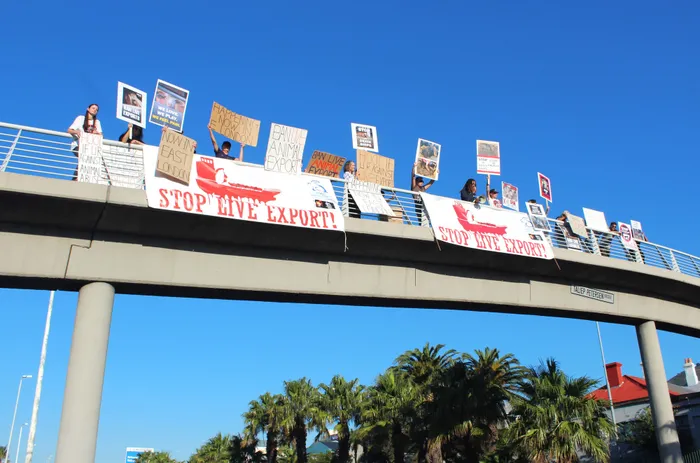Activists protest against livestock 'death ships’

Animal-rights activists protest from a freeway bridge in Woodstock against livestock exports.
Animal-rights activists took to a freeway bridge in Woodstock to protest against exporting livestock.
About 20 people from the newly formed Stop Live Export SA (SLESA) unfurled "stop live export“ banners from the side of a pedestrian bridge over Nelson Mandela Boulevard and held up placards saying ”ban live exports“, ”stop the death ships“ and ”stop cruelty“, on Tuesday April 16.
This was in response to the Department of Agriculture, Land Reform and Rural Development (DALRRD) permitting the shipping of livestock on the Gelbray Express, which docked in East London the day before.
The group is also protesting against the export of 56 000 sheep, 1500 cattle and 200 goats on the Al Messilah from East London to Kuwait.
“It's an inhumane practice that should be outlawed,” said SLESA founding member Lara van Rensburg. “Animals will suffer. There is no reason that they should be at sea for 21 days.”
She hopes to see the issue “on the agenda” in the national elections.
Beauty Without Cruelty, another animal-rights organisation, supported the protest. Its spokesperson, Chad Cupido, said the transportation of animals by sea could lead to diseases contagious to humans. “How we treat our animals has a direct correlation to how we treat our public health.”
DALRRD spokesperson Reginald Ngcobo declined to provide details of the Gelbray Express’s route or the number of animals being shipped, but National Council of SPCAs spokesperson Jacques Peacock said it had left East London on Friday April 19 for Mauritius.
“This method of trade causes pain, suffering and distress to many animals, including high mortality rates occurring during the voyage,” he said.
“Animals are subjected to unhygienic conditions such as the build-up of faecal matter and urine; build-up of noxious gases such as ammonia; faulty or broken ventilation systems may result in animals suffering from heat stress or exposure to high levels of noxious gases such as ammonia.”
Mr Ngcobo said the only reason why animals were exported was because farmers wanted the best prices for their livestock. He said the department worked with the NSPCA which inspected the vessels “to ensure all live animals export guidelines are adhered to. This is done for each and every consignment”.
Mr Peacock said the NSPCA had pressed DALRRD to promulgate regulations for the export of live animals by sea.
“During exports, the NSPCA is the only organisation with a focus on welfare,” he said.
